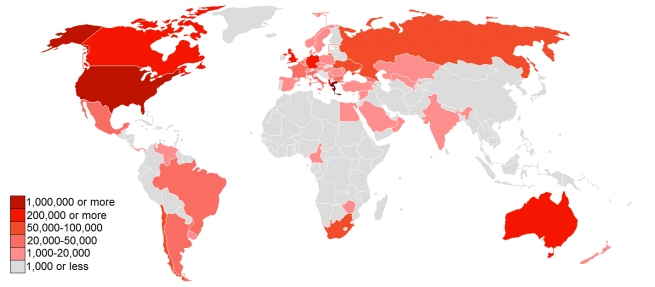Outside of Greece, there is another Greece whose borders stretch all over the world! A blue-white “country”, with a huge population and people with power, wealth, connections, valuable acquaintances, but mostly with a flame and determination to preserve and protect national rights …
At this time, when the threats not only to our territorial integrity, but also to our national sovereignty are obvious, it is valuable and useful to know how big the Greek nation is.
GREEKS LIVE IN ALL COUNTRIES OF THE WORLD
The General Secretariat of Hellenes Abroad estimates that there are more than 6,000,000 (possibly 7 million) citizens of Greek origin living outside of Greece. The quantitative indicators of the modern Greek diaspora are not the main criterion for evaluating the role of Greeks abroad.
The most important thing is the quality and scale of the activities they develop. So, in the USA, in addition to emigrants with huge fortunes, many from time to time were elected to the Senate, Congress, local parliaments, state parliaments, and also to large municipalities.
In Australia, the number of Greek senators and MPs (state and federal) is much higher than the same number of other ethnic groups with large populations (such as Italians).
The cultural activity of the Greeks (in the arts and humanities) in France is impressive, given their small numbers.
Greek shipowners dominate the City of London, although some have left the British capital since Brexit.
The economic surface of the Greeks of Africa far exceeds their “demographic image”, despite the hardships they faced (for example, in Egypt under Nasser).
But where does all this come from?
Greek emigrants came from a small and poor country. In order to survive migrating to foreign countries, they had to be able to survive on their own, often in unpleasant situations in the host countries due to religious, social, or even racial prejudice by dominant ethnic groups against them.
In this way they mobilized all their forces, which proceeded from the individual to the family, and from there to the collective Greek level, creating an inherited tradition of horse racing, which gradually and with great difficulty led to their economic and social upsurge.
And any minimal offenses cannot tarnish the image of the Greeks abroad and their offer both to Greece and to their “second homeland” …
Greeks abroad are scattered in 140 countries of the world!
The largest concentration of persons of Greek descent is found in the United States (about 3,000,000), followed by Europe (2,000,000), including the countries of the former Soviet Union, Australia (650,000 to 700,000), Canada (about 350,000), Asia and Africa (about 100,000), Central and South America (about 60,000).
NEW IMMIGRANTS
Since the beginning of the recession in Greece, there has been a new wave of immigration of Greeks abroad.
The General Secretariat of Hellenes Abroad has collected, where possible, data on trends recorded to date. This registration is not easy as (mainly for tax reasons) most immigrating Greeks do not come into contact with the local consular authorities.
According to a relevant document from the Washington Embassy, our consular authorities do not have data on the number of Greeks who immigrated to the United States from 2010 to the present.
However, according to the Department of Homeland Security USAwhere relevant data were found, between 2010 and 2014, 6,340 permanent residence permits were granted to Greek citizens.
According to relevant Ottawa Embassy document and Department of Immigration, Refugees and Citizenship statistics Canada, between 2010 and the first quarter of 2016, 1,616 residence permits were granted to Greek citizens with permanent residence status. In addition, 687 temporary work permits were issued to Greek citizens between 2010 and 2014.
According to our diplomatic bodies in Australia since 2015, the arrival of young Greeks was observed after 2010, with an influx of about 9,000 people per year.
Statistics of the Federation of Greek Communities in Netherlands show an increase in the flow of immigrants: from 16,000 Greeks until 2010, this number is now 24,000, not counting about 2,500 students.
According to Austrian Statistical Office, between 2010 and 2015, 6165 Greeks lived in Austria.
Denmark: The total number of Greeks living in the country on the first day of 2016, according to the Danish statistical office, was 2,360 people (on the corresponding day in 2010 there were 941 people). There is an increase in the number of Greeks, especially in the 25-29 age group.
SECOND GREECE
The fact that there is another Greece beyond the borders may seem excessive, but it has a basis. The third big wave of migration that the country knows may not have the dynamics that the previous two had (the first at the beginning of the last century and the second after the Second World War), but significantly strengthens this second Greece.
Reportedly
United Kingdom: The number of Greeks receiving a National Insurance Number (NIN) has increased significantly in recent years, according to data from the UK Department for Work and Pensions. The Social Security number is required to enter the UK labor market and is the most reliable indicator of the number of Greeks going there in search of work.
The vast majority of those registered (about 90% of the total) are from the broader 18-44 age group, with the 45-59 age group also showing significant percentage gains. By gender, those registered in 2015 are distributed approximately as follows: 45% of women and 55% of men.
Of particular interest are data on Germany. The country’s Federal Statistical Office estimates the number of citizens of Greek origin, regardless of nationality, at 453,000 for 2019.
According to the vice-president of the Greek community of Alexandria, Andreas Vafiadis, there are only 9,000 people with Greek citizenship in Egypt, of which no more than 300 live in Alexandria.
But let’s also look at Greeks abroad in other countries, based on censuses or estimates: Canada 252,960 (2011 census), South Africa 120,000, Belgium 35,000, France 35,000, Switzerland 11,000, Italy 30,000, Netherlands 12,500,000, Sweden 12,000-15,000, Serbia 15,000 and Luxembourg 2000.
We also note a special case. Today, about 4,000 Greeks live in Mexico, although there has never been an organized migration movement to this country.
Luxembourg: This is reported by the immigration service of the ministry – the number of Greek citizens in Luxembourg in 2014 was 2108 people, and in 2015 – 2572 people.
Cuba: Between 2010 and 2015, 29 Greek citizens immigrated to Cuba, according to the Cuban State Statistics Service.
Switzerland: Greeks who have settled in recent years in the area of jurisdiction of the Consulate General in Geneva (the cantons of Geneva, Vaud and Valais) are estimated at about 5,000 people. Most of them have higher education and work in hospitals, multinational corporations, universities, research centers, banking institutions and other private companies.
United Arab Emirates: after 2010, there was a trend towards the arrival of the Greeks. From 1,500 expatriates in 2010, their number increased to 1,850 in 2011, to 2,600 in 2012 and to 3,352 in 2013. They mainly work in the construction sector, trade, shipping and tourism.
QatarA: From 450 expatriates in 2008, the number of Greek immigrants reached 1,000 in 2014 and continues to grow. Most are employed in construction.
Data used books I. Chasiotis “REVIEW OF THE HISTORY OF THE MODERN GREEK DIASPORA”.







More Stories
Greece announces 198 beaches "fully protected"without umbrellas and sun loungers
The Rhodes Week site is open – who can take a free vacation for 7 days
The Chinese built a fake Santorini